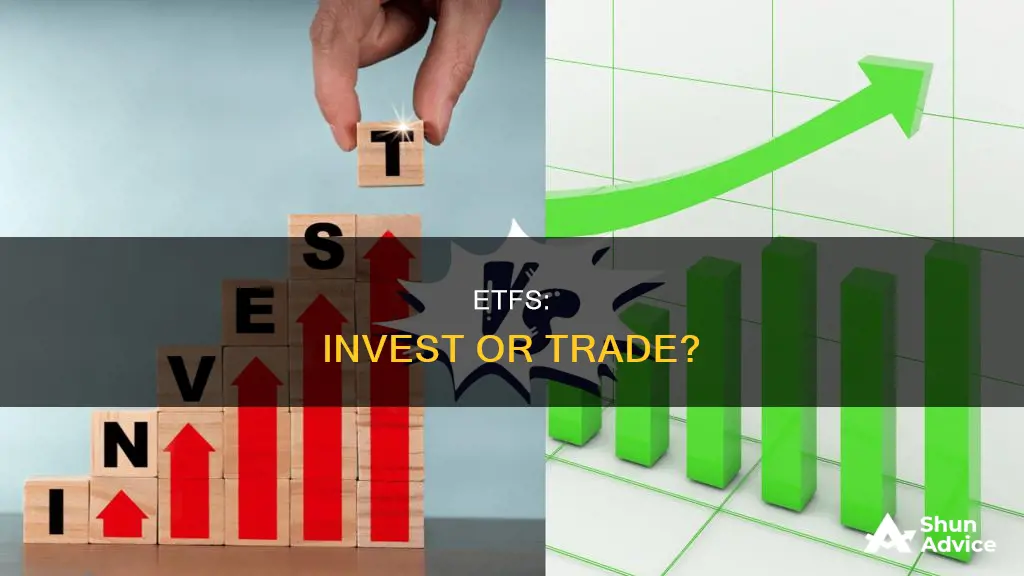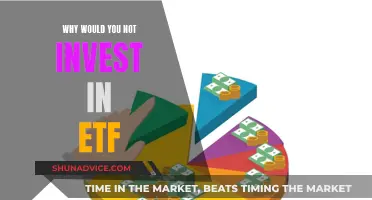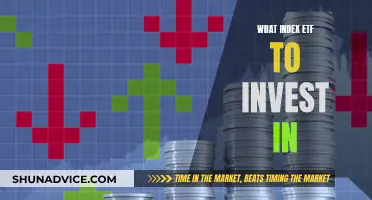
Exchange-traded funds (ETFs) are a type of investment fund that combines the best attributes of stocks and mutual funds. They are a collection of assets, often stocks or bonds, that can be traded on major exchanges such as the NYSE and Nasdaq. ETFs are an excellent entry point for new investors into the stock market as they are cheap, typically carry lower risk than individual stocks, and provide instant diversification.
ETFs are similar to mutual funds in that they are both baskets of investments. However, ETFs are more liquid and are traded on public exchanges like stocks. They are also more tax-efficient than mutual funds.
ETFs are similar to stocks in that they are traded on public exchanges and have unique ticker symbols. However, ETFs are less volatile than individual stocks and provide instant diversification.
ETFs are a great option for investors who want to benefit from diversification and lower fees. They are also a good choice for those who want to invest in specific sectors or themes without picking individual winners. However, ETFs may underperform the best-performing stocks, and they do charge expense ratios for owning the fund.
What You'll Learn

ETFs vs. stocks
Exchange-traded funds (ETFs) and stocks are similar in some ways, but they have fundamental differences and present different upsides and risks. This comparison will break down the differences between ETFs and stocks, as well as the pros and cons of each, to help you decide which is better for your portfolio.
How ETFs and Stocks Differ
A stock represents fractional ownership in a single company, whereas an ETF is a collection of assets, often stocks or bonds. A single ETF might own dozens or even hundreds of stocks. So, by owning a single share of an ETF, investors can own an indirect stake in all the stocks (or other assets) held by the fund. ETFs often invest in stocks that have a specific focus area, such as large companies, value-priced stocks, dividend-paying companies, or those operating in a specific industry.
ETFs trade like stocks on major exchanges, such as the NYSE and Nasdaq. They are priced throughout the trading day and can be bought and sold at any time the market is open. Mutual funds, on the other hand, are priced once per day after the market closes.
ETFs are typically passively managed, meaning they replicate a specific index of assets, such as the S&P 500. In contrast, stocks allow investors to invest in the success of a single company.
The Pros and Cons of Stocks
Advantages of investing in stocks:
- Investing in an individual stock can deliver very high returns.
- A single stock can potentially return a lot more than an ETF, where you receive the weighted average performance of the holdings.
- Stock prices can fluctuate a lot from day to day and month to month, but a strong stock might go up 50% or more in a single year, especially in a hot market.
- Commissions on stock trading have been slashed to zero at major online brokers.
- Investors who hold a stock for more than a year may enjoy lower capital gains tax rates.
- Stocks can pay dividends, and over time, those dividends can rise as top companies increase their payouts.
Disadvantages of investing in stocks:
- Stocks can be very volatile in the short term, and you may need to sell at a loss and may never recover what you invested.
- Volatility can be dangerous for investors who have all their wealth tied up in just one or a few stocks.
- Stocks aren't a guaranteed investment, and you may lose all your money.
- Because an individual stock tracks the performance of the company over time, you have to own a winning company to make money.
- Much effort is required to analyze and value individual stocks, and many people don't have the time or desire to do so.
The Pros and Cons of ETFs
Advantages of investing in ETFs:
- ETFs allow you to buy one fund and have a stake in dozens or even thousands of companies.
- ETFs offer the power of diversification, reducing your risk and increasing your returns.
- ETFs tend to be less volatile than individual stocks, meaning your investment won't swing in value as much.
- The best ETFs have low expense ratios, and there are no commission fees at major online brokers.
- It takes little investing expertise to invest in ETFs and earn high returns.
- ETFs can be traded at any time the market is open, giving you a highly liquid asset.
Disadvantages of investing in ETFs:
- ETFs will underperform the best stocks in the fund, meaning investors could have owned just those stocks and done better.
- ETFs charge an incremental cost, the expense ratio, for owning the fund.
- Not all ETFs are the same, so investors have to understand what they own and what it could return.
- Like stocks, the investment performance of ETFs isn't guaranteed, and you could lose money.
- You can't control what's invested in any single fund.
ETF vs. Stock: Which is Better for Your Portfolio?
Buying individual stocks or ETFs can work better for individual investors in different scenarios:
When stocks are better:
- You enjoy analyzing and following individual companies and have the time to devote to investing.
- You want to find outperformers, such as Amazon or Microsoft, and beat the market.
- You're an advanced investor.
When ETFs are better:
- You don't want to spend much time investing.
- You want to beat most investors, even the pros, with little effort.
- You don't want to analyze individual companies.
- You're a new or intermediate investor.
- You want to invest in a specific trend without picking winners.
Of course, it's possible for investors to do both. For example, you could have 90% of your portfolio in ETFs and the remainder in a few stocks that you enjoy following.
ETFs: The Retail Investor's Friend or Foe?
You may want to see also

ETFs vs. mutual funds
Exchange-traded funds (ETFs) and mutual funds are similar in that they are both professionally managed collections or "baskets" of individual stocks or bonds. They are also similar in that they are both less risky than investing in individual stocks and bonds. However, there are some key differences between the two.
How They Are Traded
ETFs trade like stocks and are bought and sold on a stock exchange, with price changes throughout the day. This means that the price at which you buy an ETF will likely differ from the prices paid by other investors. Mutual funds, on the other hand, are purchased directly from the fund provider, and orders are executed once per day, with all investors receiving the same price.
Minimum Investment
ETFs do not require a minimum initial investment and are purchased as whole shares. You can buy an ETF for the price of just one share, usually referred to as the ETF's "market price". Mutual funds, on the other hand, typically have minimum initial investments of several hundred or a few thousand dollars, and these are normally a flat dollar amount rather than being based on the fund's share price.
Management Style
While both ETFs and mutual funds can be actively or passively managed, most ETFs are passive investments pegged to the performance of a particular index. Mutual funds come in both active and indexed varieties, but most are actively managed by fund managers.
Tax Efficiency
ETFs can be more tax-efficient than mutual funds as they may have lower turnover and can use the in-kind creation/redemption process to manage the cost basis of their holdings. Mutual funds, on the other hand, may trigger capital gains taxes for shareholders when a sale of securities within the fund occurs, even if the fund overall has gone down in value.
Suitability
ETFs are generally considered more suitable for investors who want to make intraday trades, use advanced order types, or have a low minimum investment. They are also a good choice for those who want more hands-on control over the price of their trade or are looking for an index fund. Mutual funds, on the other hand, are better suited to investors who invest frequently or want to set up automatic investments or withdrawals. Actively managed mutual funds may be preferable for those seeking to outperform the benchmark index or who are investing in less efficient markets.
Best ETFs to Invest in This Year
You may want to see also

Pros and cons of ETFs
Pros of ETFs:
- Lower costs: ETFs tend to have lower expense ratios than actively managed funds, and because they are passively managed, they don't require analysts, which further reduces costs.
- Tax efficiency: ETFs are more tax-efficient than mutual funds as they realise fewer capital gains, and investors can decide when to sell to avoid higher short-term capital gains tax rates.
- Diversification: ETFs offer diversified investments, reducing an investor's risk. One ETF may contain tens, hundreds, or thousands of different types of investments.
- Flexibility: ETFs can be traded during market hours, and investors can wager on declining markets by short-selling.
- Simplicity: ETFs are simple to invest in, and they allow investors to diversify across horizontals, like industries.
- Transparency: ETFs disclose their holdings each day, allowing investors to keep a close eye on what they're invested in.
Cons of ETFs:
- Costs: While ETFs are more affordable than mutual funds, investors still incur costs such as trading fees, and these costs depend on the brokerage firm and type of ETF.
- Limited diversification: In some cases, investors might be limited to large-cap stocks due to a narrow group of equities in the market index, and some ETFs may not be ideal for hands-on investors who want to avoid certain asset classes.
- Lower returns: While ETFs are less risky, investors could earn more by investing in stocks, and dividend yields may be lower than with high-yielding stocks.
- Shutdown risk: There is a risk that an ETF will close if it doesn't bring in enough assets to cover administrative costs, which could result in unexpected fees and taxes.
Ally Invest's ETF Offerings: SPYDER ETFs and More
You may want to see also

How to invest in ETFs
- Open a brokerage account: You will need a brokerage account to begin buying and selling securities like ETFs. Many brokerages have no account minimums, transaction fees, or inactivity fees.
- Find and compare ETFs: There are thousands of ETFs listed, so use screening tools to narrow down your options based on criteria such as asset type, geography, industry, trading performance, fund provider, administrative expenses (expense ratios), commissions, volume, holdings, and performance.
- Buy your chosen ETF: The process for buying ETFs is similar to buying stocks. Navigate to the “trading" section of your brokerage's website and input the ticker symbol, current trading price, number of shares, and order type.
- Sit back and relax: Congratulations, you've just bought your first ETF! These funds can form the basis of a well-diversified portfolio. There's no need to constantly check its performance, but you can access that information through your brokerage's website or by typing the ticker symbol into a search engine.
Key considerations for investing in ETFs
- Diversification: ETFs provide instant diversification by allowing you to invest in multiple assets at once, reducing your risk.
- Costs and fees: ETFs typically have lower fees and expense ratios than other types of funds, but there may be commission fees from online brokers.
- Tax implications: ETFs have tax advantages over mutual funds. You may only need to pay capital gains taxes when you sell the ETF, and you can decide when to sell to avoid higher short-term capital gains tax rates.
- Liquidity: ETFs are traded on exchanges, so you can buy and sell them during market hours. However, less frequently traded ETFs may be harder to unload.
- Shutdown risk: There is a small risk that an ETF will close if it doesn't bring in enough assets to cover administrative costs, which may result in unexpected fees and taxes.
- Performance: While ETFs aim to match or beat the performance of their underlying assets or indices, their returns may vary due to expenses and other factors.
ETFs for Tech: Direct Investment Strategies
You may want to see also

ETFs and taxes
Exchange-traded funds (ETFs) are considered a low-cost and transparent investment option. They are also more tax-efficient than mutual funds, which is integral to their appeal. However, it's important to understand the tax rules and strategies that apply to ETFs to make better investment decisions.
- ETFs have different tax rules depending on their assets. Profits from the sale of ETFs held for under a year are taxed as short-term capital gains, while those held for longer are considered long-term gains and are taxed at a lower rate.
- Selling an ETF and buying the same ETF after less than 30 days may trigger the wash sale rule, which means you can't offset other capital gains.
- ETFs are often said to have better tax treatment than mutual funds because they create and redeem shares using in-kind transactions, which aren't considered sales and don't trigger taxable events.
- The sale of your shares in an ETF is a taxable event. In the US, holding an ETF for more than a year qualifies for long-term capital gains treatment, while holding for a year or less results in a higher tax rate.
- ETFs are generally more tax-efficient than mutual funds because they have fewer "taxable events". Mutual fund managers need to constantly rebalance the fund, triggering capital gains for shareholders, while ETF managers use "creation units" to minimise taxes for investors.
- ETF dividends are taxed according to how long the investor has owned the fund. Holding for more than 60 days results in a "qualified dividend", taxed from 0-20%, while holding for less than 60 days is taxed at the investor's ordinary income tax rate.
- Certain types of ETFs, such as international ETFs, leveraged/inverse ETFs, commodity ETPs, and exchange-traded notes (ETNs), have different tax treatments and may be less tax-efficient.
- ETF investors can use tax strategies such as tax-loss harvesting and holding ETFs with gains past their first anniversary to take advantage of lower long-term capital gains tax rates.
ETFs: Good or Bad Investment Choice?
You may want to see also
Frequently asked questions
ETFs are a great way to invest in a diverse range of stocks, bonds, and other assets at a minimal expense. They are also more liquid and incur lower trading fees than mutual funds.
ETFs are often low-cost, but they are not free. ETFs also do not offer the same high returns as investing in individual stocks.
To invest in ETFs, you need to open a brokerage account, choose your first ETFs, and then let your ETFs do the hard work for you.







